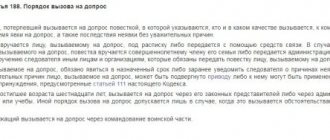How is a witness summoned for questioning in a criminal case?
A witness can be summoned for questioning only within the framework of a criminal case. Remember! Interrogation without a criminal case or outside the framework will be illegal. The only possible option for summoning a witness for questioning, which is provided for by the legislation of the Russian Federation, is for the body to send an official document indicating the procedural status and reason for the summons - a summons. In practice, the investigator and interrogating officer often calls the alleged witness on the phone and asks him to come to the department to “talk”; in the case of a legitimate question about the summons, they often promise to issue a summons on the spot.
ATTENTION! A summons to a “Conversation” or “Preliminary Interrogation” by telephone call from an investigator or interrogator is not a summons for interrogation in accordance with Article 188 of the Code of Criminal Procedure of the Russian Federation. There is no such concept in the Code of Criminal Procedure of the Russian Federation as “conversation”. There is no such concept in the Code of Criminal Procedure of the Russian Federation as “preliminary interrogation”.
If you are summoned for questioning as a witness by telephone, you should not be afraid to ask the investigator or interrogating officer to send by letter an official summons for questioning as a witness. A subpoena will help you prove the summons as a witness, explain your absence from work, and, in case of illegal actions, challenge the investigator’s actions in court.
It is important to understand the norm of Article 188 of the Code of Criminal Procedure of the Russian Federation, in which a summons can be TRANSMITTED through means of communication, but HANDED TO a witness only upon signature. The signature on receipt of the summons is important for the decision on the application of sanctions for failure to appear.
Skip to content
What is the article of the Code of Criminal Procedure about?
A person acquires procedural status from the moment a summons is served on him. A subpoena is a document that creates a legal relationship between a specific subject and the investigative body. The summons can arrive by mail, can be transmitted by telephone, telegraph, or fax. In all cases, the sender must receive information that the recipient has received the summons. Without confirmation of this fact, forced drive is not permissible.
The summons indicates: who is called in for questioning and in what capacity, to whom and at what address the investigative event will take place, as well as the date and time of appearance. The person being called is often warned that in case of failure to appear without good reason, certain coercive measures will be applied to him. A person summoned for questioning cannot avoid visiting the investigator. And refusal to testify may result in criminal liability.
The summons must be served personally on the person summoned for questioning. If he is temporarily absent, then the summons is served on an adult resident of the same place of residence. For example, the management of the enterprise where the witness is employed or the directorate of an educational institution. You can submit a summons to a serviceman through the command of the unit. As for minor witnesses, they are notified of the interrogation through a legal representative or parents.
If the procedure for calling for interrogation is violated, undesirable consequences may arise in the form of declaring the interrogation itself invalid, and the information obtained during the event as inadmissible evidence.
Basic provisions
The Code of Criminal Procedure recommends that a document such as a summons be served exclusively on people who have certain information. Summoning for questioning people whose knowledge of the circumstances of the crime being investigated is questionable or minimal is not recommended. Protocols of interrogations of such witnesses do not help the investigation, but only clutter up the criminal case. At the same time, citizens are needlessly distracted from their usual activities, losing valuable time and respect for law enforcement agencies.
According to general rules, people can only be summoned for questioning on weekdays from 9 a.m. to 7 p.m. In exceptional cases, a summons may be served on weekends, but only if the proceedings are urgent.
A summons serves as a valid reason for a person’s absence from work or place of study. The summons will also guarantee compensation for wages for the specified time and reimbursement of expenses incurred in connection with the appearance.
If a minor child is summoned for questioning, the subpoena is addressed to him, but is handed to the parent, who is obliged to ensure his appearance. In exceptional cases, when a child under 16 years of age is summoned for questioning without the knowledge of the parents, a police officer must ensure attendance along with the school administration and a psychologist. The minimum age of a witness is not limited by law, but children under 9 years of age are rarely called in for questioning.
The situation is interesting when a witness is a prisoner serving a sentence in prison. In this case, the summons is handed over to the administration of the correctional institution, which, together with the escort, ensures the appearance of the witness for questioning.
If a witness is in a pre-trial detention cell for another proceeding, he will remain under arrest without being sent to the place of execution of the sentence until he testifies during interrogation in the case in which he is a witness.
The summons must indicate in what capacity the person is being summoned for questioning. If the summons states that the person summoned is a witness, and after his appearance they are detained, then such an event will be declared illegal.
If the circumstances that served as the basis for the detention of a person became known to the investigator after the summons was served, then the detention is justified and is not considered a violation.
Interrogation of the Code of Criminal Procedure of the Russian Federation: types, rules and procedure
Rules for issuing a summons and deadlines for delivery
Subpoenas are served only on people who have certain information important for the investigation or those who witnessed the incident. In rare cases, people who have close relationships with the accused are called in for questioning. A subpoena served on a witness must be drawn up in accordance with the Code of Criminal Procedure.
The notice must indicate:
- the name and position of the authorized person who calls the witness for questioning;
- address of the court or other institution to which the summons is made;
- the name of the person being called and his address;
- number of the criminal proceedings within which the interrogation will be conducted;
- time, day, month, year and place of appearance of the summoned person;
- procedural status of the summoned person;
- the consequences of a person’s failure to appear, indicating the text of the relevant provisions of the law;
- the valid reasons provided for by the Code of Criminal Procedure for which a person may not appear when summoned;
- signature of the authorized person making the call.
The absence of at least one item on the agenda may be grounds for considering the agenda issued in violation of the law and, accordingly, invalid. Having received a summons without one of the listed items, a person may decide not to visit the investigator without any consequences, however, it is advisable to notify the investigator of such a decision.
The investigator must serve the summons no later than three days before the date of the interrogation. If the investigator violates the three-day deadline for sending the summons, the person summoned may not appear for questioning.
How is a subpoena to call a witness served?
A summons for interrogation is served in person against a signature or by mail and means of communication. “Media of communication” is a fairly general concept and includes mail, telegram call, telephone message, fax, electronic means of communication, etc. The call must be recorded in the file.
For example: if an investigator transmits a call by telephone, he must compile a telephone message. In the telephone message, indicate to whom and when the telephone message was transmitted, the telephone number on which the information was transmitted, the required amount of data in accordance with the law and attach it to the case materials. In practice, they still try to notify in writing, against signature, since it is difficult to identify a person over the phone.
“Without any procedural formalization, a telephone message cannot be a substitute for the delivery of a subpoena and be considered as a proper summons to court or to an investigative agency for questioning.” Determination of the Judicial Collegium for Criminal Cases of the Supreme Court of the Russian Federation dated September 23, 2008 N 81-O08-85.
Skip to content
How to interview additional witnesses?
Lawyer Antonov A.P.
The burden of proof of the commission of a crime and other significant circumstances, due to the provisions of Article 14 of the Code of Criminal Procedure of the Russian Federation, lies on the prosecution. However, this does not mean that the suspect (accused) should simply wait for his fate to be decided. Formally, the prosecution and defense have equal rights; they have equal opportunities to prove their position and can equally collect evidence. However, in reality, this provision is not observed, and the defense cannot even fully familiarize itself with the materials of the criminal case until the end of the preliminary investigation.
Only after this it becomes clear how justified the accusation is and what position is more advisable to take. From this point of view, it turns out that a lawyer can take serious steps to prove the innocence of the client only after the investigation is completed. To do this, when familiarizing yourself with the materials of a criminal case in accordance with Article 217 of the Code of Criminal Procedure of the Russian Federation or within 3 days after familiarization, the accused or lawyer must submit a petition for additional investigative actions.
Familiarization with the materials of the criminal case means that the preliminary investigation has been completed. However, this rule is often violated by the investigative bodies themselves. After familiarization, additional investigative actions (interrogation of witnesses, request of documents) are possible only at the request of participants in the criminal process, and not at the discretion of the investigator or on the instructions of the head of the investigative body. The situation when the investigator, on his own initiative, carries out investigative actions after familiarizing the participants with the materials of the criminal case and, more importantly, does not introduce them to new materials of the criminal case, is contrary to the law. Additional evidence is considered inadmissible.
There are often cases when the defense is unreasonably refused to carry out additional investigative actions or to include documents, including a list of witnesses who are to be summoned to the court hearing. According to Part 4 of Article 217 of the Code of Criminal Procedure, the investigator finds out from the accused and his defense attorney which witnesses, experts, and specialists are to be summoned to the court hearing for questioning and confirmation of the defense’s position. That is, this rule assumes that if a lawyer attaches a list of witnesses to be called, which contains their addresses and telephone numbers, then such a list is attached without a special order from the investigator.
Another violation is the unreasonable refusal to submit such a list. The reason for this is that its inclusion is not provided for by the norms of the Code of Criminal Procedure of the Russian Federation. However, this justification for refusal does not comply with the law. Firstly, the accused can defend himself, and the lawyer can defend himself, by any means not prohibited by law, therefore, in the absence of a direct prohibition on such actions, it is implied that they are permitted. Secondly, the grounds for such a refusal may include the fact that the persons on the list do not have information disproving the involvement of the accused in the commission of a crime. But the presence of such information is precisely revealed during the interrogation of the witness, that is, the investigator actually prejudges the testimony of the witness, which has not yet been given, which is contrary to common sense.
In all of these cases, there are significant violations of the Code of Criminal Procedure of the Russian Federation, which cannot be corrected later, in a court hearing. Therefore, if, in the presence of such violations, a criminal case is transferred to court, it is subject to return to the prosecutor in accordance with Article 237 of the Code of Criminal Procedure of the Russian Federation.
Sincerely, lawyer Anatoly Antonov, managing partner of the law firm Antonov and Partners.
Still have questions for your lawyer? Ask them right now here, or call us by phone in Moscow +7 (499) 288-34-32 or in Samara +7 (846) 212-99-71 (24 hours a day), or come to our office for a consultation (by pre-registration)!
Can a subpoena be served through other persons?
Serving a subpoena to call a witness is possible in the following cases:
- Temporary absence from place of residence;
- On behalf of the investigator, it can be handed over for delivery to individuals or organizations. The order must be formalized;
- For military personnel - through the command of the unit;
- For minors, through legal representatives or the administration of an educational institution or work, in cases where there is an obstacle (for example, the father interferes with the interrogation without objective reasons) on the part of the legal representatives, the witness may be called through other persons;
Temporary absence is another vague concept in the law. Temporary absence means that a person is absent from his place of residence, but can return to his place of residence and arrive in time for the date and time of interrogation.
In case of temporary absence from the place of residence, a summons may be served:
- to a family member of the witness - a relative, mother, father, adult child (the only condition is living together as a family member and reaching adulthood, the degree of relationship is not important);
- administration at the place of work - the administration is not served with a summons, but is handed over to the employee for delivery;
Skip to content
Carefully read the interrogation protocol and make adjustments if necessary.
As already mentioned, the results of the interrogation are documented in a protocol, and how correctly your answers are entered into such a protocol largely determines what consequences this event will have for the taxpayer. Do not forget that your testimony is entered into the protocol by the person taking it, so he does it in a way that is beneficial to the controlling authority.
Therefore, before you put your signature on the protocol, you should carefully re-read the entire text of the document compiled (including not only the answers you gave, but also the questions asked). After all, even one word twisted by a tax officer can completely change the meaning of what you said. If your answers to questions are written inaccurately, paraphrased or distorted, the protocol contains phrases that you did not say, the written wording of the question does not correspond to what was voiced, ask the tax officer to make corrections or personally note this in the comments section (write with what wording you do not agree and indicate the ones you need).
Legal experts recommend signing the protocol on each page, and if it is printed on only one side of the sheet, crossing out the blank side to avoid reprinting the text or replacing pages of the document.
What are the consequences of a witness failing to appear for questioning?
The obligation of a witness to appear for questioning follows from the provisions of Art. 56, 188 Code of Criminal Procedure of the Russian Federation. A witness summoned for questioning must appear at the appointed time and date at the specified place or report the reasons for his failure to appear.
Thus, the witness has two duties
- Show up at the appointed place and time;
- Notify the investigator in advance of the reasons for failure to appear;
The failure of a witness to appear before the investigator in a criminal case for questioning must be due to a valid reason, otherwise the person may be subject to sanctions provided for in Article 111 of the Code of Criminal Procedure of the Russian Federation
Comments on Article 188 of the Code of Criminal Procedure
Procedural legislation clearly regulates the procedure for calling witnesses for questioning. The legislator pays special attention to the interests of minors who may be witnesses in the case. Children under 16 years of age are not responsible for themselves, all responsibility is assigned to their parents or legal representatives, therefore, if the summoned (minor) does not appear for questioning, certain coercive measures will be applied to his parents, who were supposed to monitor the witness’s appearance before the investigator.
The legislator establishes penalties for failure to appear for questioning. If a witness refuses to testify several times, he may be forcibly brought in for questioning and even criminal proceedings may be initiated against him. Penalties and forced arrest are not applied if the witness fails to appear for compelling reasons.
The following are considered valid reasons for failure to appear for questioning:
- disease;
- failure to receive a summons in a timely manner;
- other circumstances that deprive a person of the opportunity to appear on time.
It is worth noting that not every disease, even if it is confirmed by a certificate of incapacity for work, serves as a basis for failure to appear before the investigator. The disease must actually prevent a person from fulfilling his duty to the state. Confirmation of illness must be a doctor's certificate or other medical document confirming poor health.
With regard to the timing of receipt of notification, it must be said that the summons is considered to be served in a timely manner if there is a long gap in time between service and the designated time of appearance, which does not require extraordinary efforts for timely appearance.
Quite often, the failure of a witness to appear for questioning occurs due to the investigator’s banal negligence. He serves the subpoena on one of the family members of the witness called, without ensuring that the latter has given the notice. For the fact that the subpoena was not handed over, the third party does not face anything; the law does not punish such behavior.
By “other circumstances” we usually mean a break in the operation of transport or a breakdown, the impossibility of leaving young children or an elderly relative without care, a natural disaster, etc. The decision on whether the reason for failure to appear is valid is made by the investigator based on the available and provided information.
The procedure for interrogating an accused in criminal proceedings and the time limits under the Code of Criminal Procedure, Article 173
What may be the consequences of failure to appear?
In case of failure to appear for interrogation , when there is a summons for it and evidence that the summons itself has been received by the addressee, the investigator may resort to bringing in the witness he needs.
This is relevant for those cases where there is evidence that the evasion of this appearance is deliberate, and the summoned person does not have any valid, serious reasons for this.
Deportation means forced delivery for interrogation. A special resolution is issued for this purpose. Well, it must contain the following information:
- Full name of the citizen being delivered;
- the address where he lives;
- the purpose of its delivery.
The very function of delivering a witness for interrogation is assigned to the bodies of inquiry (investigative officers, investigators, district police officers).
The drive procedure is not applicable only to adolescents under fourteen years of age, pregnant women and citizens with serious illnesses.
In addition, the Criminal Procedure Code allows for the use of other coercive measures:
- Obligation to appear. It is assumed that the summoned person is not only obliged to appear for all calls for questioning, but also does not have the right to change his place of residence without notifying the authorities conducting the investigation.
- Monetary penalties.
The investigator has the right to draw up a protocol stating that the witness does not fulfill his obligations to appear when summoned and send it to the judicial authority. There, within five working days, the judge will consider this protocol, after which he will make a decision to collect a certain amount from the violator directly to the state treasury.
If citizens do not have valid and sufficiently serious reasons for failure to appear, then such irresponsible witnesses receive a fine of 2,500 rubles. up to 5000 rub.











